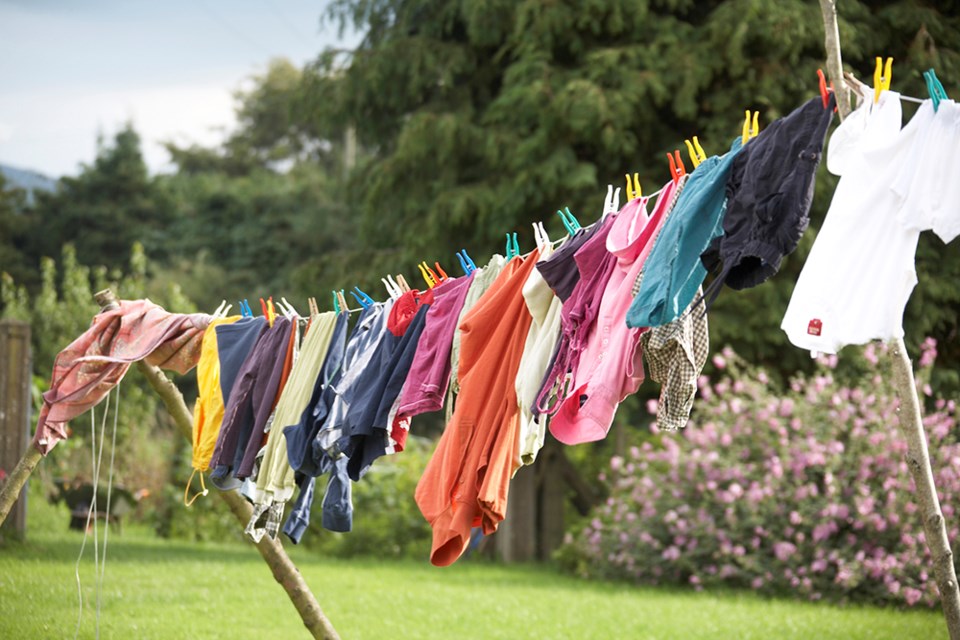Minimalists have a secret behind their saintly grins: less stuff equals less maintenance. This is true of all our possessions, but perhaps most notable with the ones we trip over, launder and stain with frequency.
Clothes protect us from the elements and clothing choices can signal underlying values, so some of us spend a lot of time engaged with our closet’s contents. Even the least fashionable among us has to navigate our dirty laundry and grease spots, but those with streamlined wardrobes have less of both.
That said, the temptation to over consume is facilitated by fast fashion. The glut of “cheap” clothing flooding the market also means an abundance of frayed hems, undone seams and trendy items that quickly lose their appeal.
What if we bought less, but better quality? The initial sticker shock might be tamed by dividing the cost over how long and often an item will be used. Be wary of tricking yourself into frivolous purchases here, sticking to wardrobe pieces you know you’ll still love in a number of years. By donating and giving away clothing you don’t truly love, you’ll be following minimalist Marie Kondo’s rule of only keeping what sparks joy. Your drawers will be easier to sort through as will your laundry and getting dressed in the mornings.
Sometimes we make life harder than it needs to be. To keep clothes looking and smelling fresh, the trick may be to do less. Use a shorter wash cycle, often called delicate or handwash, as this means less agitation of fabrics. Turn the temperature down – high heat can shrink clothes and set in unseen stains. Air out and spritz odorous armpits with an essential-oil-infused spray rather than washing. Spot clean stains rather than the whole garment. Avoid the habit of washing after one use if unnecessary.
A little extra care might be in order from time to time to extend the life of your clothing. Pre-soaking stinky armpits in a washbasin with white vinegar – scented if you wish – will force embedded odour to take a walk. Hanging up clothes on the line or in a warm ventilated space indoors means massive energy savings, but also lowers friction and thus pilling of fabrics. Spring temperatures on a sunny day are more than enough to do the job. Use wool dryer balls to speed up time needed in a dryer.
Bringing vintage clothing back to life is a skill that will save you an incredible amount of money, which in some economies equates to your time as well. Remove lint from your grandpa’s hand-me-down wool fedora - there are eco-friendly versions that operate with static electric charge rather than single-use sticky tape. De-pill funky thrift store sweaters with clothes “shavers” or an electric de-piller – an oddly satisfying task. Repair a tear with a patch. Fix a broken zipper. Sew on a colourful button.
A word on lint
To the surprise of many, lint is infused with microplastics in the form of tiny threads shed by synthetic clothing. Because of this, lint should never be added to a compost pile, nor should it be used as a (toxic) fire starter.
This might give you pause when you wonder where the filters on washing machines are. As these are not yet regulated, they are not required. Each wash cycle flushes microplastics to wastewater treatment facilities, which are not designed to filter these pollutants out.
You can buy drain filter attachments, or more simply, wash clothes in a “guppy” bag, which captures lint before it drains away. Even better: favour natural fibres such as wool, linen, hemp, bamboo and organic cotton.
Much like a well-maintained car, loved up clothing will love you back for years to come.
Let’s Talk Trash is qathet Regional District’s waste-reduction education program. For more information, email [email protected] or go to LetsTalkTrash.ca.



